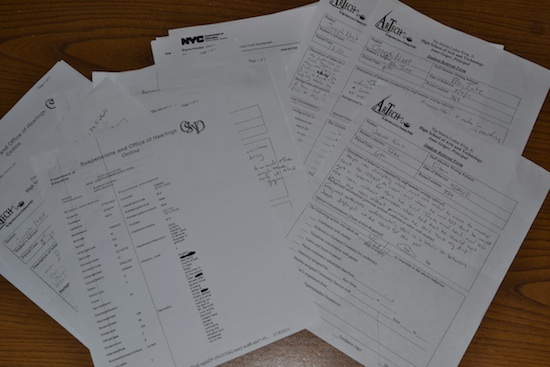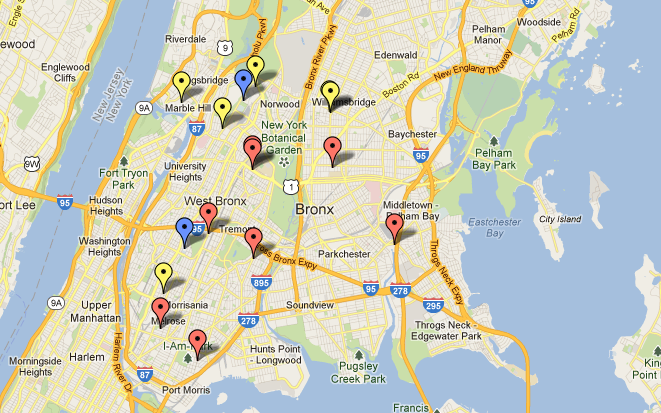
Since he entered high school two years ago, Joseph Neat, a 17-year-old Manhattan high school sophomore, has found himself trapped in a cycle of punishment, spending almost more time suspended than in class. Since September of 2010, Joseph, a special needs student, has spent a total of four months of his high school career kicked out of school.
The student suspension rate in the city has more than doubled since Mayor Michael Bloomberg took office in 2002, according to a January 2011 report by the New York Civil Liberties Union. For students like Joseph, long-term suspensions of one month or longer have increased by 132 percent, up from 31,879 in 2002 to 73,943 in 2009. The vast majority – 53 percent over the past 10 years – were served by black students, who only make up 33 percent of the public school population.
One month and a half after Joseph arrived at the High School for Arts and Technology at West 65th and Amsterdam Avenue as a freshman, he served an 18-day suspension for “horseplay” and throwing french fries. Two weeks after he returned to class, the burly teen, who has been diagnosed with Attention Deficient Hyperactivity Disorder, was suspended again. This time he served one-week out of class for refusing to sit down during a fire drill. Less than a month later, the special education student was hit with another 18-day suspension, accused of bullying.
Since then, Joseph has been trapped in a constant cycle of exclusion from class– one-day suspensions served in school, 7-day and 30-day suspensions served outside the building.
And it is not over. Now as a sophomore, Joseph is facing another 30-day punishment for knocking over a garbage can in the cafeteria. His mother, Cynthia Neat, said she was recently notified informally by the school’s dean that her son will be facing yet another month-long suspension once he returns in May for apparently throwing a wallet.
After repeated attempts to contact the school, Dean Testa Stewart and Principal Anne Geiger have declined to comment on Joseph’s case or the reasons behind his chronic suspensions. The Dean’s secretary said she could not schedule an interview because he was too booked attending suspension hearings.
“I know how they do it, the minute he goes back, they’ll take him out again,” Neat said, as she waited for an hour and half in the school’s lobby next to the metal detectors before she was escorted upstairs to see the dean. “I think it’s crazy.”
Joseph’s suspensions are served in another Midtown school, the High School of Graphic Communication Arts, which has an alternate learning center. There, the increasingly withdrawn teen does worksheets under supervision.
Joseph is also enrolled in the DeHostos-Wise program, an after-school enrichment center in her building that provides him with counseling and homework help. He is big for his age, something that his mother and counselors posit might be the reason the school began to perceive him as a bully. As a result of his learning disability, he reads below grade level and has fallen farther behind due to the suspensions. “How can a child learn if he’s never in school?” asked Neat, a mother of three.
“We’re seeing a lot of older students suspended for subjective things, verbal comments, and we see students who are being unfairly targeted,” said Avni Bhatia, an attorney at Advocates for Children that represents students under suspension. Joseph and his mother have been working with the advocacy group since January. His advocate, Ana Espada, was able to successfully argue that Joseph should receive 30 days, rather than an initial sentence of 90 days for bullying and “disrespect”.
There is little evidence to support the assumption that suspensions lead to better behavior. Bhatia said that oftentimes behavior issues are not entirely the fault of the student. “A lot of things are things that could be fixed with better classroom management, and it’s not the fault of the child,” she said.
Espada added that because of Joseph’s ADHD, he often doesn’t know when to stop talking if provoked. Many of his suspensions for talking back to a teacher and not sitting down are merely results of his disorder.
“All of these things are part of his disability, all of those things are behaviors not within his control,” Espada said. She added that he is supposed to receive a full-time paraprofessional and a reading counselor, but the school has not provided a reading counselor and only provided him with a part-time para, citing funding issues. “They’ve just been avoiding him,” she said. “He’s a child with emotional disturbance, but they haven’t provided the services he needs. All they’ve done is taken him away from an opportunity to learn.”
What is obvious is that the suspensions are not helping Joseph learn to read on grade level. His counselor at the DeHostos-Wise program said that Joseph’s teachers do not give him substantive work. “It was as if they just randomly took pages from a workbook, ripped them out, and said here, fill this out,” said Miguel Grant, who has been counseling and working with Joseph on his reading skills for the past year.
“This high school is the worst,” said Joseph, who is, in person, a shy but friendly teen with a deep voice. He speaks slowly and chooses his words carefully. “It was my choice to come here, but I haven’t learned anything.”

Joseph said he initially chose the High School of Arts and Technology because he liked to draw and wanted to learn more about computers. Art Tech, as it is known by students, is a small 9th through 12th grade school that caters specifically to students who have not performed well in middle school. About 14 percent of its student body has special needs, and the school specializes in teaching entrepreneurial skills like Photoshop and how to run a business. The school is also known for its high suspension rate. In the 2009-10 school year, it suspended 123 students, or 21 percent of its student body. The city-wide average is 7.6 percent.
The constant suspensions take an inevitable toll on the student who is suspended. “I’d rather not talk or play with people, my friends have been noticing since I’ve been back, and I’d rather not speak with teachers unless spoken to,” said Joe.
Grant said that the suspensions have made him more introverted and less open to learning. “He doesn’t want to communicate with his teachers, that’s one of the goals of going to school,” said Grant. “If you’re not communicating with your teachers you’re not getting an education.”
Joseph added that he feels confused and frustrated by the suspensions. Oftentimes, he feels that he has not done anything wrong, and that sometimes he is being targeted.
“I’m not going to say I haven’t done anything wrong, but if I did do something, it was something small,” he said. “I don’t bother nobody, the only time I say something is when someone does something to me. And there have been times in school where I haven’t said anything for a long time, but once they say a certain thing enough times, that’s when I go, because you can only take it so much if somebody bothers you.”
Both he and his counselor have agreed that the High School of Art and Technology is not the best fit for him. Grant and Joe’s mother are currently looking for alternative schools that will offer in-school counseling and give him the opportunity to graduate with a high school diploma.
But for now, Joseph will have to serve out the rest of the school year, most likely in suspension centers.
“Most of the time, I don’t even know why they suspend me,” Joseph said. “I just know I’m suspended.”


